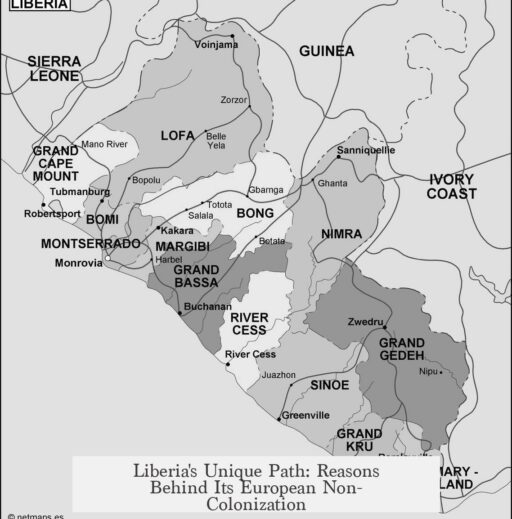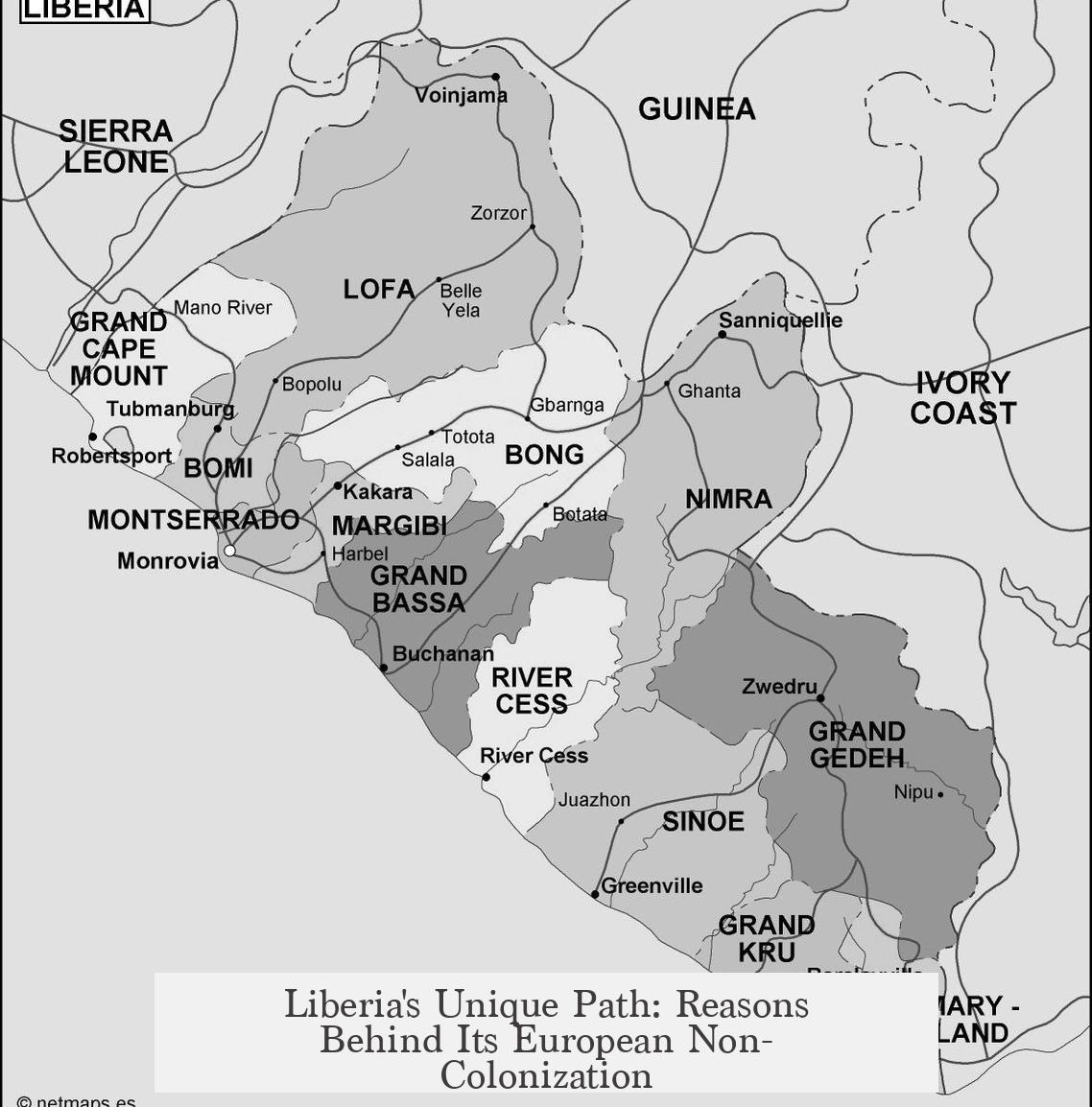Liberia was not colonized by a European power because it was established and supported primarily by freed African Americans under the aegis of the United States, which asserted a unique sphere of influence over the country. This American connection, coupled with European powers’ reluctance to challenge U.S. interests, moral hesitation concerning the slave trade legacy, and the backing of abolitionist movements, effectively prevented European colonization.
Liberia’s origins differ significantly from most African countries colonized by Europeans. It was founded in the early 19th century by freed slaves from the United States. These settlers were supported by groups like the American Colonization Society (ACS), which purchased land from local tribes to create a homeland for freed African Americans. The ACS’s purchase—covering a tract roughly 130 miles by 40 miles—was modest, akin to early colonial transactions such as the Manhattan Island acquisition but served to establish a foothold in West Africa without direct European control.
This unique foundation tied Liberia closely to the U.S. Liberia was never a formal American colony but became a “sphere of influence.” The United States consistently made clear to European powers that Liberia fell under its informal protection. For instance, when Liberia faced financial struggles, particularly after defaulting on loans from London in 1905-1906, the U.S. stepped in to provide capital, enabling Liberia’s government to continue functioning. The presence of the U.S. Navy also played a deterrent role, physically preventing European annexation attempts by “showing the flag.”
European powers, mainly Britain and France, did threaten Liberia’s territorial integrity. After 1882, both nations made at least five attempts to annex parts of Liberian territory, successfully cutting off portions of its borders. However, these attempts were limited and opportunistic. U.S. diplomatic and naval support often thwarted full-scale European colonization of Liberia. A notable episode involved a British merchant ship and a threat of British intervention, which was dissolved through U.S. intervention, further signaling U.S. commitment to Liberia’s sovereignty.
Beyond political and military factors, moral and ideological reasons influenced Liberia’s uncolonized status. The abolitionist movement in the United States significantly contributed to Liberia’s founding. Advocates of the ‘Back to Africa’ ideology, including figures like W.E.B. Du Bois and Abraham Lincoln (at least initially), supported resettling freed slaves in Africa. These efforts created a distinct political identity for Liberia, seen more as an experimental republic led by African Americans rather than a European colony. The American Colonization Society’s activities symbolized this, framing Liberia as a testament to African independence.
European colonial powers also held a certain moral awakening regarding the transatlantic slave trade. Britain and France, dominant colonial forces in West Africa, had been principal players in the slave trade. By the 19th century, a prevailing sense of guilt or moral responsibility influenced their policies. This factor contributed to their reluctance to colonize Liberia fully, allowing the American-backed settlement to endure independently. Although some exceptions occurred, such as German trading companies operating within Liberia, the overall European approach respected Liberia’s status more than it did other West African regions.
The nature of Liberia’s land acquisition also set it apart from other colonies. The ACS’s nominal purchase from local tribes mirrored European colonial methods but bypassed direct European imperial governance. The purchase was justified by the ACS as spreading Christianity and civilization, paralleling older colonial claims. However, this transaction provided Liberia a strategic buffer against European occupation, emphasizing its unusual position in West Africa’s colonial landscape.
| Factor | Description |
|---|---|
| Settlement by freed American slaves | Liberia was founded by freed slaves with American support, making it a unique African polity linked to the U.S. |
| U.S. sphere of influence | The U.S. exerted protective influence, deterring European colonization attempts through diplomacy and naval presence. |
| European threats and limited territorial encroachment | Britain and France made small territorial gains but avoided full annexation due to U.S. opposition. |
| Abolitionist movements and the American Colonization Society | Anti-slavery activists supported Liberia as a resettlement project, enhancing its independence and unique status. |
| European moral atonement | Former colonial powers hesitated to colonize Liberia out of guilt for the slave trade legacy. |
| Land acquisition method | Nominal land purchases from local tribes prevented direct European colonization and legitimized American-backed settlement. |
Liberia’s independence from European colonization represents a combination of geopolitical, ideological, and moral dynamics. The American backing provided international protection, discouraging European conquest. Meanwhile, abolitionist ideals embedded in Liberia’s foundation made it more than a colonial territory; it was viewed as a symbol of African and African American autonomy. European powers’ own ethical reflection on their roles in the slave trade contributed to their restrained approach. These factors together ensured Liberia remained outside the typical European colonial sphere in Africa.
- Liberia was primarily established by freed African Americans with American support.
- The U.S. maintained a protective sphere of influence, preventing European colonization.
- Britain and France threatened Liberia but only acquired minor territories.
- Abolitionist movements shaped Liberia’s unique identity and deterred European ambitions.
- European powers showed moral restraint due to their past involvement in the slave trade.
- Land purchases legitimized American-backed settlement rather than European conquest.
Why Was Liberia Not Colonized by a European Power?
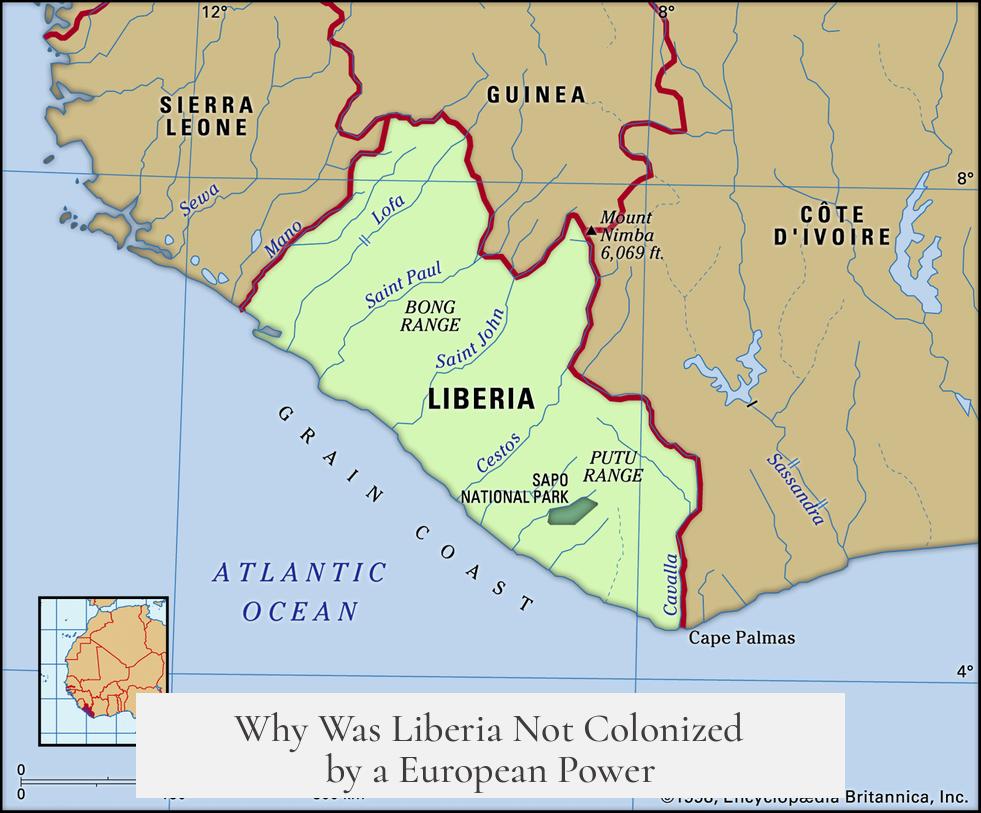
Liberia was not colonized by a European power because it was established and protected as a sphere of American influence, settled by freed African Americans with strong U.S. backing, which deterred European colonizers and created a unique political status unlike other African territories.
Let’s unpack that. It’s not every day you find an African country that escaped the European colonial scramble, especially during the late 19th and early 20th centuries when empires gobbled up territories like hungry kids at a birthday party.
What’s so special about Liberia? Well, it wasn’t a typical African colony. Instead, Liberia emerged as a settlement founded by freed African American slaves, supported by the United States through efforts largely orchestrated by the American Colonization Society (ACS). These were not just any settlers—they were mostly former slaves seeking a new start on the African continent, but with a distinctly American flavor of governance, economics, and ties.
The American Experiment in Africa
The ACS bought a tract of land on the West African coast—approximately 130 miles by 40 miles—paid with what could be generously called a “paltry fee,” rivaling the infamous Manhattan purchase. Yes, one could say the purchase of Liberia was America’s own version of “beads and trinkets.” The justification? Spreading Christianity and offering a fresh start for those freed from slavery.
This unique founding story created a de facto American colony on African soil, even if the U.S. government never formally colonized it. Europeans, it seems, took one look and said, “Eh, that’s under American care. Let’s not poke the bear.”
The Sphere of Influence Shield
Although Liberia was independent, it functioned essentially as a U.S. protectorate. The United States had a keen interest in protecting this outpost for multiple reasons: strategic foothold in Africa, humanitarian ideals, and geopolitical rivalry with European powers.
When Liberia defaulted on British loans in 1905-06, it was the U.S. that stepped in with the loans necessary to keep Liberia’s government afloat. Talk about a financial lifeline! The U.S. Navy also made occasional appearances to “show the flag” and signal to any adventurous European naval forces that Liberia was off-limits.
So, America’s quiet but clear assertion of influence created a deterrence mechanism against European annexation. European powers didn’t take Liberia seriously as a ripe target—they knew the U.S. would frown upon or outright prevent full European colonization.
European Encroachments: Nibbles, Not Bites
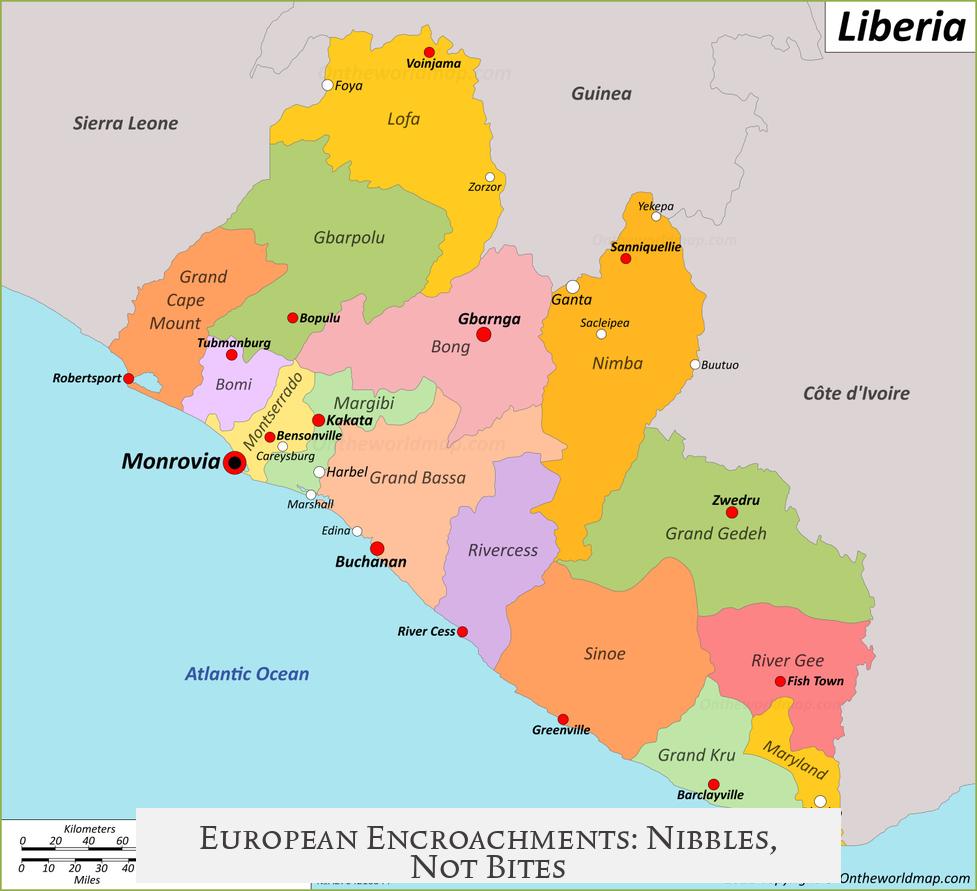
That’s not to say European countries weren’t curious. Both Britain and France made territorial advances on Liberia’s borders, especially after 1882. France, Britain, and even Germany tried nipping pieces off—successful in shrinking Liberia’s original borders in several cases.
But full colonization attempts were rebuffed. In one illustrative episode, a British merchant ship stirred the pot, prompting a U.S. response that ultimately squashed any European attempt at full takeover. That’s the kind of diplomatic and naval muscle-flexing that kept Liberia safe from becoming a European colony.
Moral Atonement for the Slave Trade
Another angle often overlooked is the European powers’ sense of guilt or moral responsibility for their roles in the transatlantic slave trade.
Many European countries, primarily Britain and France, had been involved in the horrific trafficking of millions of Africans into slavery. By the late 19th century, these same powers began to publicly atone through anti-slavery efforts and showing restraint in colonizing territories like Liberia.
It’s telling that while Britain firmly held large chunks of West Africa, it allowed the ACS to establish Liberia as a separate colony founded on freed slaves’ resettlement. France also refrained from colonizing Liberia fully, even if Germany broke ranks by setting up trading companies.
This moral undertone added an unusual dimension to Liberia’s political situation: a kind of informal “hands-off” policy grounded not only in power politics but also ideological sensitivity about slavery’s legacy.
Back to Africa: Ideology Meets Realpolitik
The very creation of Liberia intertwined with the abolitionist and “Back to Africa” movements that included figures like Abraham Lincoln and W.E.B. Du Bois. The idea was to repatriate former African American slaves to Africa to build a free and prosperous state.
This ideological background bolstered Liberia’s unique standing and complicated European ambitions. Colonizing Liberia meant challenging those powerful American abolitionist sentiments and risking backlash. Plus, the U.S. befriending Liberia sent a clear message that this wasn’t just another African colony to grab but a political experiment tied to American ideals.
Lessons and Takeaways
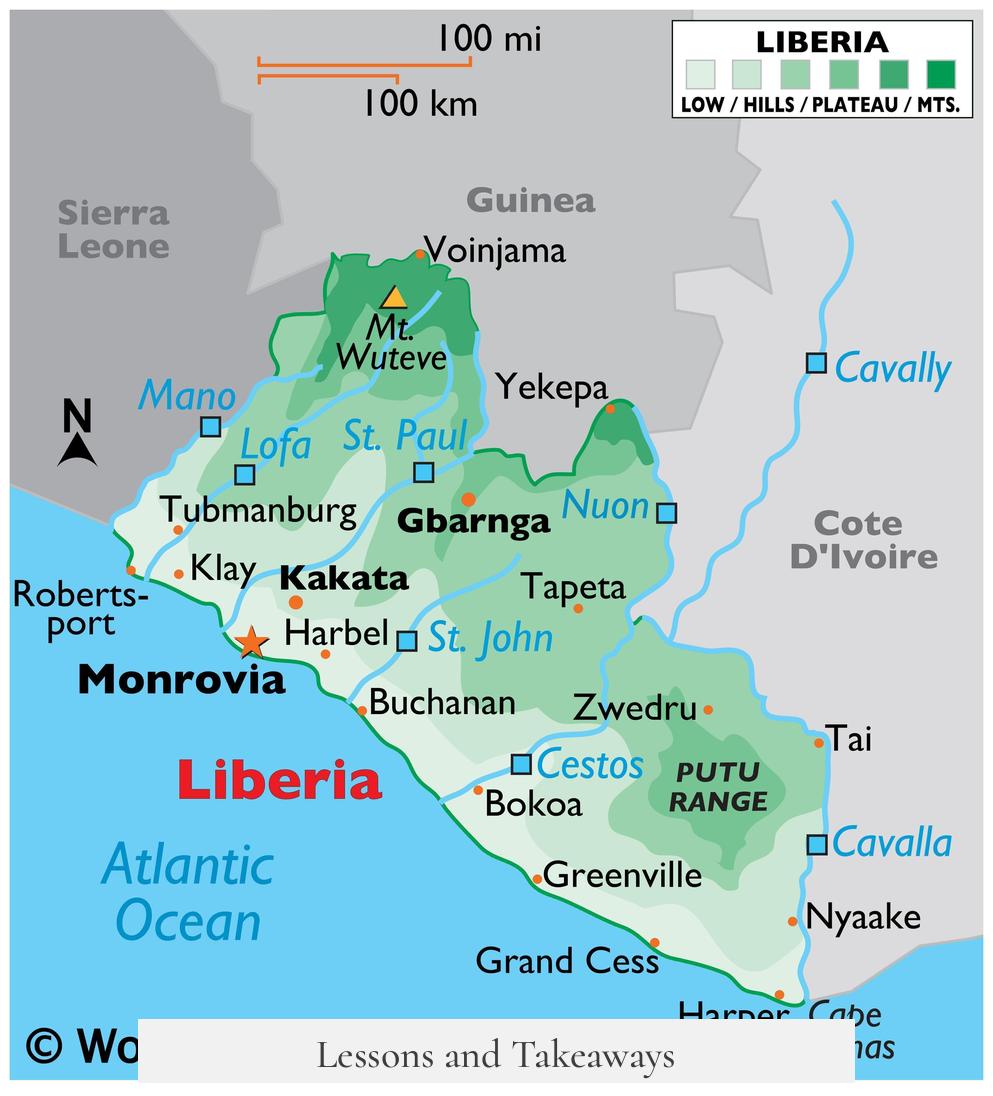
Why does this story matter today? Liberia’s exceptional sovereignty during the height of the Scramble for Africa teaches us about how geopolitical influence, ideology, and a complex history can shape—and shield—a nation’s destiny.
It also shows the limits of European colonial ambition when faced with competing power interests and shifting moral views. Plus, it reminds us that history isn’t just a story of conquest; it involves ideas, struggles for justice, and the quest for identity as much as it involves guns and treaties.
In practical terms, Liberia benefited from its American association by avoiding direct colonization. But it wasn’t all smooth sailing—the constant threat of European nibbling shaped its borders, and Liberia had to negotiate survival by borrowing heavily, often from the very powers whose interests it complicated.
Wondering how Liberia manages this legacy today? Its unique blend of African and African American heritage continues to influence its culture, politics, and relationship with the U.S.
Final Word
Liberia’s survival outside of European colonization wasn’t an accident. It was a cocktail of American support, ideological advocacy, strategic diplomacy, and European hesitation rooted in morality.
In the grand chessboard of imperialism, Liberia was a protected square. The U.S. influence made it undesirable chess prey, while European powers’ guilt and pragmatism kept them at bay just enough. So next time someone asks, “Why wasn’t Liberia colonized?” you can share this nuanced tale of freedom, geopolitics, and the push-pull of history.
Why did European powers avoid colonizing Liberia?
European powers saw Liberia as a US sphere of influence. The settlement by freed American slaves and US backing discouraged European colonizers from claiming the territory.
How did the United States protect Liberia from colonization?
The US asserted economic and naval support, kept Liberia afloat financially, and showed military presence. This deterred European powers from fully annexing Liberia.
Did France and Britain try to take Liberia?
Yes, they threatened annexation and took small border territories. However, US intervention stopped further European encroachment.
What role did the American Colonization Society have in Liberia’s status?
The Society founded Liberia to resettle freed American slaves. This gave Liberia a unique identity tied to US anti-slavery efforts, limiting European colonization motives.
Was Liberia’s establishment linked to the abolition of slavery?
Yes, many abolitionists and the Back to Africa movement supported Liberia. This ideological foundation influenced Liberia’s independence and European restraint.
Did European powers feel guilty about the slave trade regarding Liberia?
Some powers, notably Britain and France, showed restraint in colonizing Liberia partly due to moral atonement for the slave trade they once supported.
